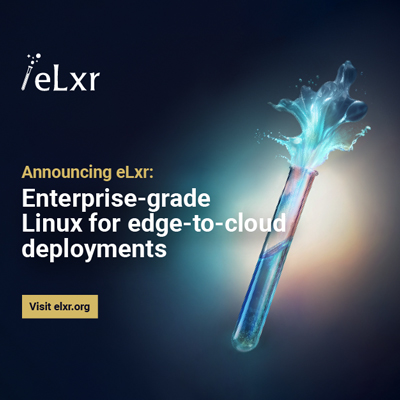
by Mark Asselstine
The eLxr project has launched its initial release of a Debian-based distribution that incorporates the intelligent edge capabilities of Debian, with plans to expand these for a streamlined edge-to-cloud deployment approach. eLxr is an open source, enterprise-grade Linux distribution designed to address the specific challenges of near-edge networks and workloads.
What Is the eLxr Project?
The eLxr project is a community-driven effort dedicated to expanding access to cutting-edge technologies for both enthusiasts and enterprise users seeking dependable and innovative solutions that scale from edge to cloud. The project produces and maintains an open source, enterprise-grade Debian-based distribution called eLxr that is user-friendly and fully honors the open source philosophy.
 The eLxr project's mission focuses on accessibility, innovation, and maintaining the integrity of open source software. Developing these advancements in an enterprise-grade Debian-based distribution ensures that users benefit from a freely available Linux distribution.
The eLxr project's mission focuses on accessibility, innovation, and maintaining the integrity of open source software. Developing these advancements in an enterprise-grade Debian-based distribution ensures that users benefit from a freely available Linux distribution.By emphasizing ease of adoption alongside open source principles, eLxr aims to attract a diverse range of users and contributors who value both innovation and community-driven development, fostering collaboration and transparency and the spread of new technologies.
The eLxr project is implementing a robust strategy for building on Debian's ecosystem while also contributing back to it. As "Debian citizens," eLxr contributors submit innovations and improvements upstream, actively participating in the community's development efforts. This approach not only enhances eLxr's own distribution but also strengthens Debian by expanding its feature set and improving its overall quality.
The ability to release technologies at various stages of Debian's development cycle and to introduce innovative new content not yet available in Debian highlights eLxr's flexibility and responsiveness to emerging needs. Moreover, the commitment to sustainability ensures that contributions made by eLxr members remain beneficial to the broader Debian community over the long term.
A Unified Approach for Intelligent Deployments at the Edge
Modern technology demands agility and responsiveness to rapidly changing requirements and operational challenges. By integrating cutting-edge technologies from open source communities and technology companies into its distribution, the eLxr project enables users to leverage innovations that may not yet be widely distributed or easily accessible through other channels.
Go to Full Article
More...